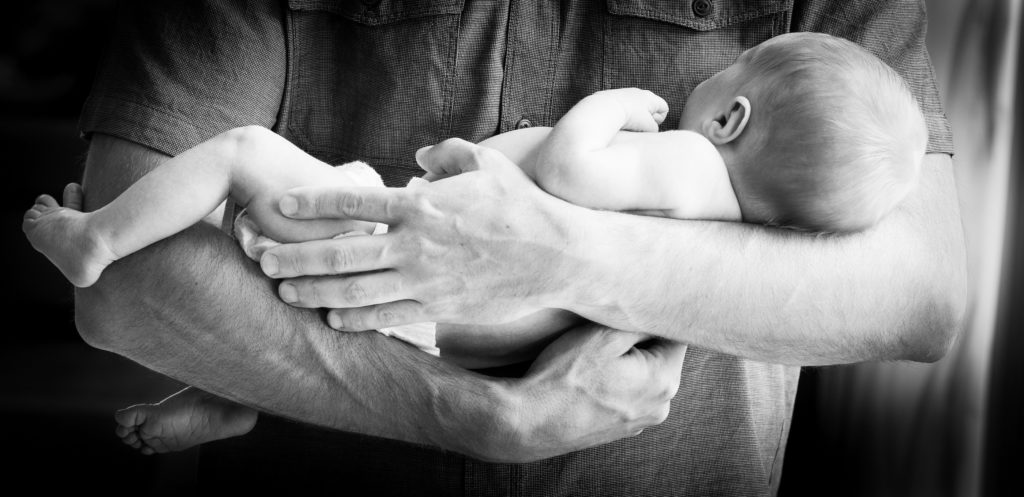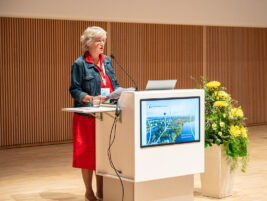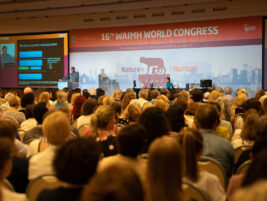After having finalized our WAIMH Infant’s Rights Position Paper and presented it in Prague at our last World congress, we had the opportunity on June 8th, 2017, to appear at the Committee on the Rights of the Child (CRC) meeting in Geneva. The aim of the meeting was to present WAIMH’s perspective on why we need to specifically address the Infant’s Rights.
On behalf of WAIMH we proposed to the CRC that: The issue of infant mental health be included in the agenda of the CRC’s discussions and implementation efforts.
This is the summary of the main points we made, and no less important, the discussion that took place with the CRC 11 members (out of 18) who were present.
Background
The Convention of the Rights of the Child implicitly takes account of the profound need of infants to grow up in the context of safe relationships and in mentally healthy living conditions. The CRC has taken up many of the issues addressed in its 2005 general comment No. 7 on “Implementing Child Rights in Early Childhood”. Nevertheless, infancy is such a basic and decisive period for the child’s development that it should also be made more explicit in the children’s rights debate. To further elaborate, a WAIMH task force (Lyons-Ruth et al., in press) has written a paper: The worldwide burden of infant mental and emotional disorder. This paper outlines why it is imperative to focus on and address infant mental and emotional health.
The worldwide burden of infant mental and emotional disorder (Lyons-Ruth et al., in press).
This document aims to create new priorities for health policy makers by highlighting:
- The concept of mental disorders, and mental and social health in infancy, in particular (birth to age 3 years), within service delivery systems and social policy is frequently unrecognized.
- The costs associated with mental disorders, and mental and social health in infancy, in particular (birth to age 3 years), remain largely invisible.
- The features of social and mental health and disorders in infancy are different than in the later years. For example, the experiences of infants are not described separately in the current versions of the ICD-10 and the DSM-5. To address this gap, the Zero to Three Diagnostic Classification, DC 0-5, a manual for disorders of infancy and very young children was developed. It is used by infant mental health clinicians but remains largely unknown among most professionals and health policy makers.
Why are these issues a problem?
- Infancy as a developmental period is unique because the brain and behavior are in vulnerable states of development during the first three years of life. Because of this developmental vulnerability, every infant has the potential to thrive and equally every infant has the potential to have its developmental path significantly deviated in response to early trauma and deprivation.
- In times of worldwide human crises caused by wars, violence, and global forced displacements, very young children suffer from insecurity and threats which they cannot understand through words or verbal explanations. Infant and early childhood experts, and parents, see first-hand that this kind of early negative experience can lead to posttraumatic stress, anxiety and depression in infants and young children.
- Empirical research has dramatically shown that such mental health challenges in early childhood can adversely affect ongoing physical and mental health throughout childhood, adolescence and adulthood.
Key points (Lyons-Ruth et al., in press)
- Adverse early experiences may be especially harmful if they occur in the first three years of life, during formative periods for brain development, leading to enduring consequences.
- Due to the infant’s immaturity, the features of symptoms and disorders in infancy are somewhat different from those in the later years, requiring separate diagnostic descriptors.
- During infancy, stressors on caregivers have particularly immediate consequences for the infant’s developing stress response systems and overall development, compared to later ages.
- Early dependence on caregivers requires different modes of mental health intervention that involve both the infant and the caregiver.
- Evidence-based intervention approaches have demonstrated success in improving outcomes for children and families.
Furthermore, the Nobel Laureate economist James Heckman (2006) analyzed rates of return relative to investments in human capital by age. He showed that:
- Gains can be realized by investing in children during the early years of life; and
- Opportunities can pay large dividends in future productivity, equity and social justice.
Priorities (Lyons-Ruth et al., in press)
- Priority on global education regarding the signs of disorder in infancy and toddlerhood.
- Priority on enhancing the availability of treatment for infants and their caregivers.
- Priority on developing reliable information regarding infant and toddler mental health in developing and war-torn countries.
WAIMH position paper on the Rights of Infants
The WAIMH position paper on the Rights of Infants is a document that has been composed by the WAIMH Board of directors in a lengthy process of back and forth feedback from our WAIMH members. The final version was approved at the 2016 WAIMH World congress in Prague. The complete document can be viewed on the WAIMH website.
This document is divided into two parts: the infant’s basic rights, that should be endorsed everywhere, regardless of society and cultural norms; and the principles for health policy that are more sociocultural context – dependent.
I. Basic Principles of Infant Rights (Birth to three years of age)
- The Infant by reason of his/her physical and mental immaturity and absolute dependence needs special safeguards and care, including appropriate legal protection.
- Caregiving relationships that are sensitive and responsive to infant needs are critical to human development and thereby constitute a basic right of infancy. The Infant therefore has the right to have his/her most important primary caregiver relationships recognized and understood, with the continuity of attachment valued and protected – especially in circumstances of parental separation and loss. This implies giving attention to unique ways that infants express themselves and educating mothers, fathers, caregivers and professionals in their recognition of relationship-based attachment behaviors.
- The Infant is to be considered as a vital member of his/her family, registered as a citizen, and having the right for identity from the moment of birth. Moreover, the infant’s status of a person is to include equal value for life regardless of gender or any individual characteristics such as those of disability.
- The Infant has the right to be given nurturing that includes love, physical and emotional safety, adequate nutrition and sleep, in order to promote normal development.
- The Infant has the right to be protected from neglect, physical, sexual and emotional abuse, including infant trafficking.
- The Infant has the right to have access to professional help whenever exposed directly or indirectly to traumatic events.
- Infants with life-limiting conditions need access to palliative services, based on the same standards that stand in the society for older children.
II. Social and Health Policy Areas to be informed by these Principles:
- Policies that support adequate parental leave so that parents can provide optimal care for their infants during the crucial early years of life.
- Policies that minimize changes in caregiver during the early years of development.
- Policies that promote the provision of informational support to parents regarding the developmental needs of their infants and young children.
- Policies that recognize the importance of facilitating emotional support for mothers, fathers, and caregivers, as an important component of fostering the optimal development and well-being of the infant.
- Policies that promote access to evaluation and treatment of risks to development by trained professionals who are culturally sensitive and knowledgeable about early development and emotional health.
- Infants with life-limiting conditions need access to palliative services.
- The provision of adequate circumstances, including time for mothers, fathers, caregivers to get to know their infants and become skilled in providing for their infant’s care and comfort, throughout the support of their family and community. The right for parental leave, and its duration, should be valorized by the society, in a way that fits its contextual reality.
- The provision of access to relevant early educational and psychological opportunities and programs that promote good-enough relationship experiences and thus, enhance cognitive and socio-emotional development.
- Policies that ensure the provision of prompt access to effective mental health treatment for mothers, fathers, and caregivers that alleviates infants’ suffering and insure optimal development for the child.
- Policies that allocate resources for training and supervision for caregivers in babies’ institutions, foster care professionals and foster parents, as well as resources for assessing and treating foster care infant’s emotional and developmental status.
WAIMH’s key message to the CRC
We propose that the issue of infant mental health be included in the agenda of the CRC’s discussions and implementation efforts.
The meeting
Ms Renate Winter, the new Chairperson of the CRC opened the meeting while mentioning that the CRC has become aware very recently that they focused too much on education and care and hardly on mental health. She said that in light of this, our presentation comes at a very good time.
Miri Keren went through the 11 power point slides for 20 minutes, leaving half an hour for discussion (the meeting started 10 minutes late). The discussion was around nine questions asked by the CRC members and answers provided by Miri Keren, as follows:
Question : Under the list of the aims of WAIMH, you mentioned that the age range is “from Conception to the age of 3 years”. Why “3 years”? Is there a specific rationale for that age? And is the IR position paper about the prenatal period as well?
Answer: The age range is based on the scientifically-grounded notion that the first three years are a unique period in the growth and development of the brain, especially regarding the structures linked with emotions. Regarding the prenatal period, WAIMH in its activities and congresses put a lot of emphasis on understanding the impact of various factors, such as stress and trauma, on the parents and the fetus. Still, in our position paper, we have deliberately decided to address only the postnatal period, as the rights of the fetus are a separate issue (and extremely controversial as we all know).
Question : It is more a comment than a question. I think it is indeed very important to focus on the mental health issue and to make it more explicit. Also, though comment 12 includes the importance of the child’s non verbal cues to be read and understood, it probably needs to be more explicit.
Question : Would you consider a revision of the Comment 7 instead of creating a new Comment?
Answer: A revision would be very welcomed, and on behalf of WAIMH, I can assure you that we are keenly ready to invest time and effort at preparing scientific documents that would be needed for such revision process.
Question: What do you think about the right of the infant to be cared by his mother as the basis for judges to prefer sole custody rather than joint custody?
Answer: Regarding the relative importance of mothers versus fathers and its implication in custody dispute, this is a topic that is dealt with differently in various parts of the world. We know today, thanks to research data, that infants can securely attach to their fathers as well as to their mothers, and that fathers are able to be daily caregivers as well as mothers are, if given the opportunity. The view that infants first relate to their mother and only later are able to relate also to their father, does not fit this research data, so it has been very strongly grounded in the psychoanalytical view of human development. The clinical principle that guides us as clinicians is the right of the infant to experience continuity of his/her attachment relationships. Therefore, if the father has been involved in the daily care of his infant prior the separation, there is no reason why he should stop being so after the separation. On the other hand, joint custody can be at the infant’s detriment if the parents are in a continuous state of high conflict. In sum, there is not a “one answer for all”.
Question: In Africa, poverty, single parenthood and lack of qualified personal are so frequent that attention to mental health needs is not a priority. What can we do to change this in your opinion?
Answer: This is indeed a situation that evokes in us helplessness as it is so complex, in Africa as well as in many other countries, such as India for example. I think we can learn from some of our colleagues’ experience at WAIMH, such as Astrid Berg in South Africa, who has created a community-based network for lowering mother’s depression (that is more often than not linked with adverse life conditions), and thus has impacted on the mother-infant relationship and the infant’s well being.
Question: How does the infant’s right to have a permanent caregiver can fit to the situation of institutional care?
Answer: It simply does not in most cases! Though there has been an effort to assign a “primary caregiver” to each baby in some places. This is the reason why many countries are in the process of abolishing baby homes, and prefer the option of foster families. Yet, it has been shown that most foster families need psychological accompaniment in order to be a real good-enough alternative to institutional care. Also, there is a trend in many countries (but not all) to establish a time limit for the period that an infant can spend at an institution. We may indeed need to be more explicit about this in our IR position paper.
Question: Why is the term “Best interests of the infant” does not appear in the IR position paper?
Answer: Actually, I may say that the whole document reflects what we define as the best interest of the infant! Still, it seems we need to be explicit about this important point…
Question: What do you think would be the Right of the infant to be with his mother in prison?
Answer: The infant’s right is being close to its mother as long as she has been an attachment figure before the imprisonment, and as long as the prison physical environment fits its developmental needs. In most cases, we would recommend the presence of a professional whose main task would be to ensure the baby is emotionally and physically safe with the mother and her other prison mates. I guess this is an additional point to address in our position paper!
Question: Would you define as the Best interest of the Infant to be primarily with the mother?
Answer: As I have said before, the role of fathers in the infant’s development has been proved, therefore today, the definition of the best interest of the infant is to have both mother and father attachment figures.
Ms Winter, the Chairperson, closed the meeting, while thanking me as representative of WAIMH for bringing up important issues about infants and for presneting the WAIMH Infant Rights position paper. Three members (representatives from Russia, Japan, and Norway) came out with me to continue the discussion outside of the room. Following the meeting, Mr Benyam D. Mezmur, the Past Chair of the CRC, sent the following email to Kai, Maree and myself:
“Good afternoon
Thank you very much for the interesting presentation and interaction this afternoon with the members of the Committee!!
It is not a subject matter we claim to have much expertise on and the presentation and discussion afterwards was very useful.
As I said to Prof Miri, I don’t remember the last time 4 members of the Committee followed a presenter out of the room to follow up on some things while the chair was saying let us please start:)
I hope we can make this not an event but a process, so that we benefit from your expertise as a Committee, in ensuring that the issues of infant mental health becomes well integrated in our working methods as we move forward. I will be happy to exchange few ideas.
Thank you so much all for making this a reality.
Benyam”
As one can see, we still have quite a lot of work to achieve, but it was a real step of acknowledgment of the existence of mental health in the first years of life.
References:
Heckman, J. J. (2006). Skill formation and the economics of investing in disadvantaged children. Science, 312, 1900-1902. New York, NY.
Lyons-Ruth, K., Todd Manly, J., von Klitzing, K., Tamminen, T., Emde, R., Fitzgerarld, H., Paul, C., Keren, M., Berg, A., Foley, M., Watanabe, H. (in press). Task Force Report on The Worldwide Burden of Infant Mental and Emotional Disorder. Infant Mental Health Journal.
WAIMH position paper on the rights of infants. www.waimh.org
Authors
Keren, Miri
Foley, Maree








